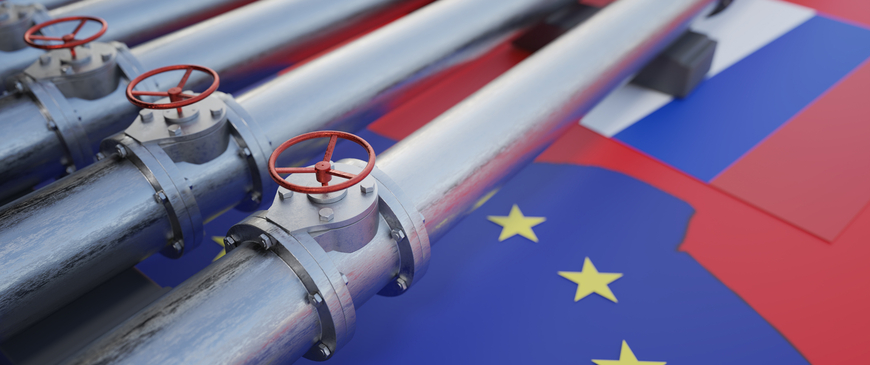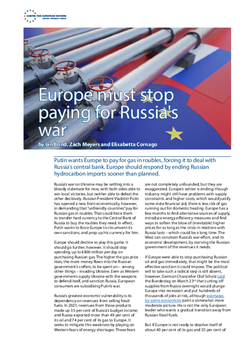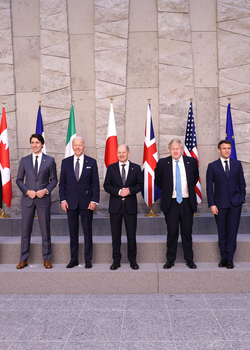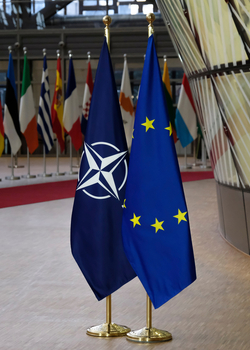
Europe must stop paying for Russia's war
Putin wants Europe to pay for gas in roubles, forcing it to deal with Russia’s central bank. Europe should respond by ending Russian hydrocarbon imports sooner than planned.
Russia’s war on Ukraine may be settling into a bloody stalemate for now, with both sides able to win local victories, but neither able to defeat the other decisively. Russian President Vladimir Putin has opened a new front economically, however, in demanding that “unfriendly countries” pay for Russian gas in roubles. That could force them to transfer hard currency to the Central Bank of Russia to buy the roubles they need. In effect, Putin wants to force Europe to circumvent its own sanctions, and prop up his currency for him.
Europe should decline to play this game. It should go further, however. It should stop spending up to €800 million per day on purchasing Russian gas. The higher the gas price rises, the more money flows into the Russian government’s coffers, to be spent on – among other things – invading Ukraine. Even as Western governments supply Ukraine with the weapons to defend itself, and sanction Russia, European consumers are subsidising Putin’s war.
The higher the gas price rises, the more money flows into the Russian government’s coffers, financing the war on Ukraine.
Russia’s greatest economic vulnerability is its dependency on revenues from selling fossil fuels. In 2021, revenues from those products made up 35 per cent of Russia’s budget income; and Russia exported more than 49 per cent of its oil and 74 per cent of its gas to Europe. It seeks to mitigate this weakness by playing on Western fears of energy shortages. These fears are not completely unfounded, but they are exaggerated. Europe’s winter is ending; though industry might still have problems with supply constraints and higher costs, which would justify some state financial aid, there is less risk of gas running out for domestic heating. Europe has a few months to find alternative sources of supply, introduce energy efficiency measures and find ways to soften the blow of (inevitable) higher prices for as long as the crisis in relations with Russia lasts – which could be a long time. The West can constrain Russia’s war effort, and its economic development, by starving the Russian government of the revenues it needs.
If Europe were able to stop purchasing Russian oil and gas immediately, that might be the most effective sanction it could impose. The political will to take such a radical step is still absent, however. German Chancellor Olaf Scholz told the Bundestag on March 23rd that cutting off supplies from Russia overnight would plunge Europe into recession and put hundreds of thousands of jobs at risk, although estimates by some economists paint a somewhat more moderate picture. He is not the only European leader who wants a gradual transition away from Russian fossil fuels.
But if Europe is not ready to deprive itself of about 40 per cent of its gas and 25 per cent of its oil supplies immediately, it can still take steps to accelerate its moves in that direction, and to put in place sanctions to constrain Russia in the long term. After the European Council meeting on March 10th, European Commission President Ursula von der Leyen said that the Commission would propose a plan to reduce imports of Russian gas by two thirds by the end of this year, and to end imports of Russian fossil fuels by 2027. But a five-year timescale is too leisurely. Though ending the purchase of energy from Russia will impose significant economic costs on Europe, it is a price worth paying to hinder Russia’s continuing assault on Ukraine, and the broader threat Putin poses to European security. European leaders should mitigate the damage to their economies and populations as much as they can, but they must stop funding Russia’s imperial adventure.
As a first step, the EU can reduce demand for Russian fossil fuels by imposing import tariffs on them. In parallel, the Union should take steps to mitigate the impact of reducing and ultimately ending Russian gas and oil imports. Above all, the EU needs to ensure that European consumers and businesses can cope with higher energy prices and the broader inflation that they will trigger. Poorer households, who spend a larger share of their income on energy, would suffer most. Operating costs for energy-intensive industries like long-distance transport, metal and fertiliser manufacturing would also rise.
There are ways to manage these costs. Reducing energy dependency on Russia requires long-term steps like investing in renewables and energy efficiency to cut demand for fossil fuels. But this will take time, so while such investments should accelerate, they should be coupled with measures with immediate impact. Member-states launched many support measures to counter energy price spikes last autumn. Today prices are higher still, and they will remain high for a sustained period. Governments should opt for targeted transfers to vulnerable consumers over sweeping VAT and energy tax cuts or energy retail price caps: transfers maintain incentives for consumers to reduce energy consumption, while keeping energy prices artificially low does not. Regrettably, several European governments, including the British, German and French, have gone in the opposite direction, cutting fuel duty and giving rebates on household energy bills – steps that will help the better off and do nothing to incentivise demand reduction. The International Energy Agency has given governments a useful menu of steps, such as lowering speed limits, to reduce oil consumption.
Reducing energy dependency on Russia requires long-term steps like investing in renewables and energy efficiency.
Even if every possible mitigating measure is adopted, imposing and maintaining a full embargo or high tariffs on Russian oil and gas imports will still damage European economies. Western governments must explain to their own citizens and businesses why it is so necessary to stop Putin’s progress, or they will risk seeing the EU and European societies divided and less resolute in opposing Russian aggression. Europe is in its current situation because it was too eager to maintain business as usual after previous instances of Russian aggression. In 2008, when Russia invaded Georgia, Europe imposed no significant sanctions. In 2014, when Putin invaded Ukraine and annexed Crimea, sanctions were stronger, but still not harsh enough to make Russia retreat, nor focused enough on limiting its scope to attack again.
In 2022, Ukraine’s forces are having some success on the battlefield, and Western sanctions are having a noticeable impact on the Russian economy, but Russia still has plenty of forces in reserve, and could, over time, make good its losses and defeat Ukraine. Europe cannot be complacent.
The West should not assume that Putin’s ambitions are limited to Ukraine, and that once the conflict there is over (in whatever form) the danger to European security will have passed. Russia’s former president, now deputy chair of the Russian Security Council, Dmitri Medvedev, published an aggressively anti-Polish article on March 21st. Medvedev’s article may hint that Poland will be the next country in Putin’s sights – or at least, the next to be threatened. That would be consistent with the Kremlin’s December 2021 proposals on European security, in which it demanded that NATO withdraw from Poland and other states that joined the alliance after 1997.
Challenging a NATO member would be a major step for Putin, and a risky one, but it is more likely if he sees Europe wavering. Countries like Germany that depend heavily on Russian energy are even now reluctant to risk supplies. But European public opinion is appalled by the atrocities committed by Russia in Ukraine; European leaders should show political courage. They must cut the westward flow of Russian gas and oil, and the eastward flow of European money that funds Putin’s war.
Ian Bond is director of foreign policy, Zach Meyers and Elisabetta Cornago are senior research fellows at the Centre for European Reform.




Comments